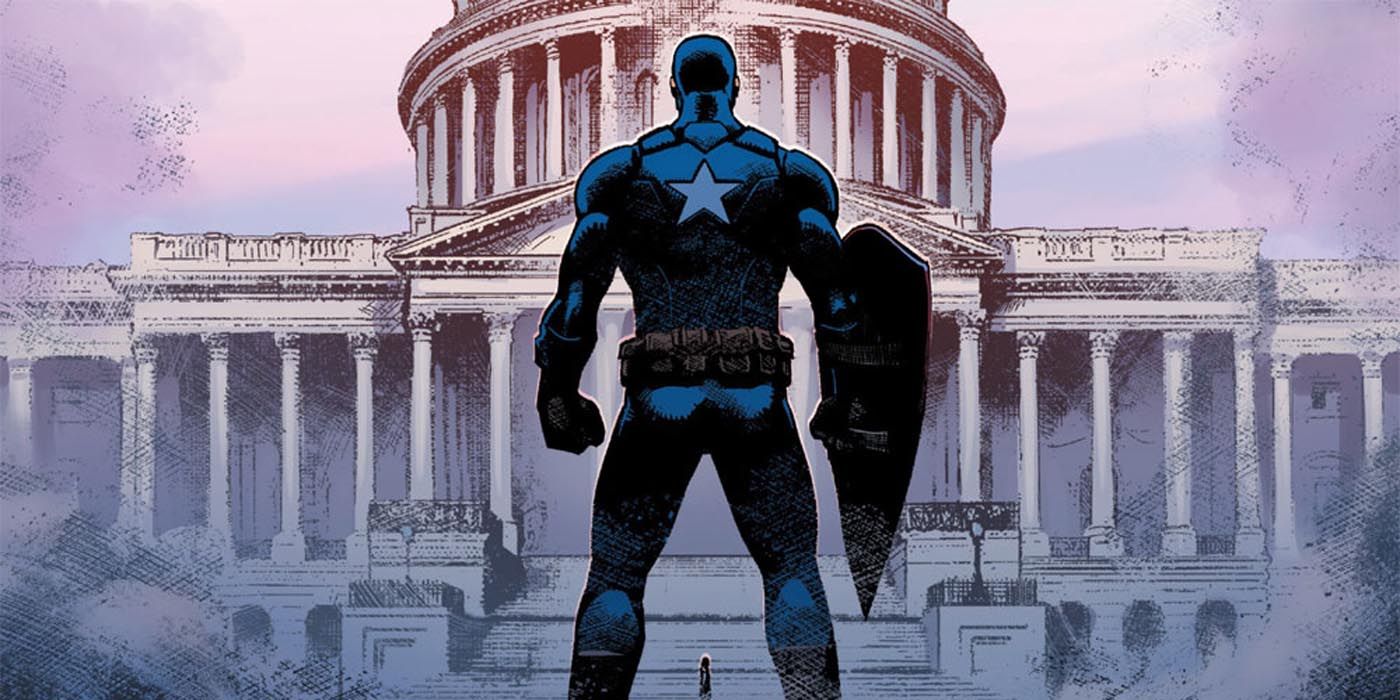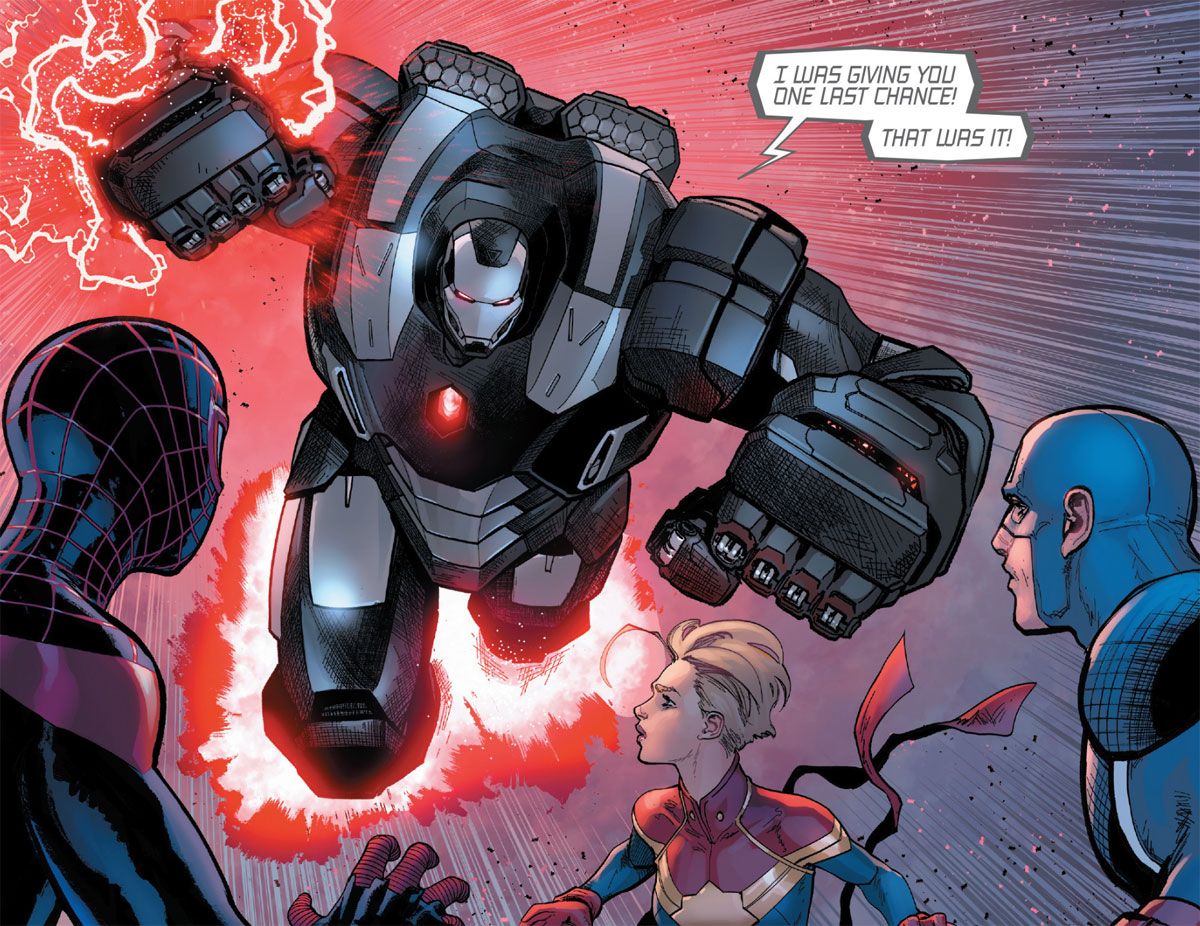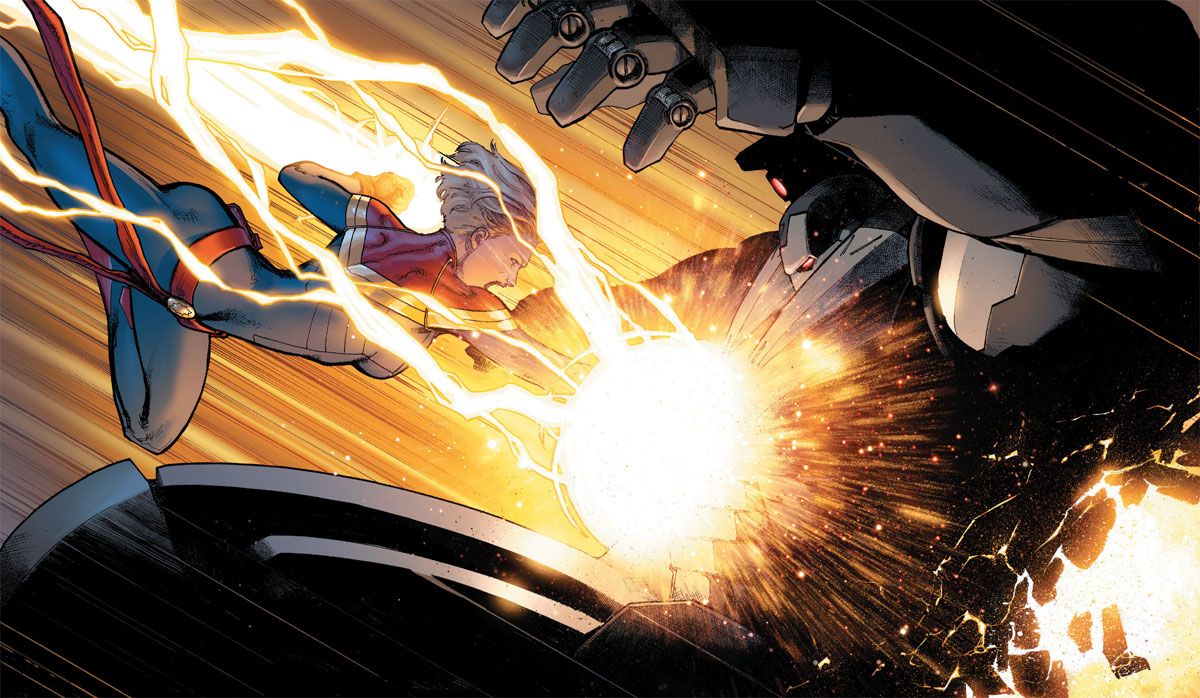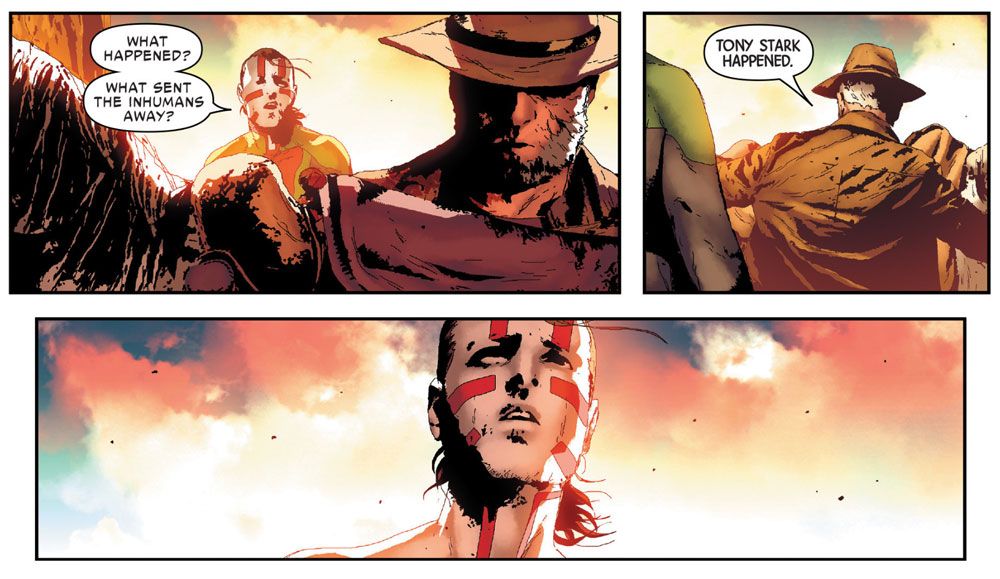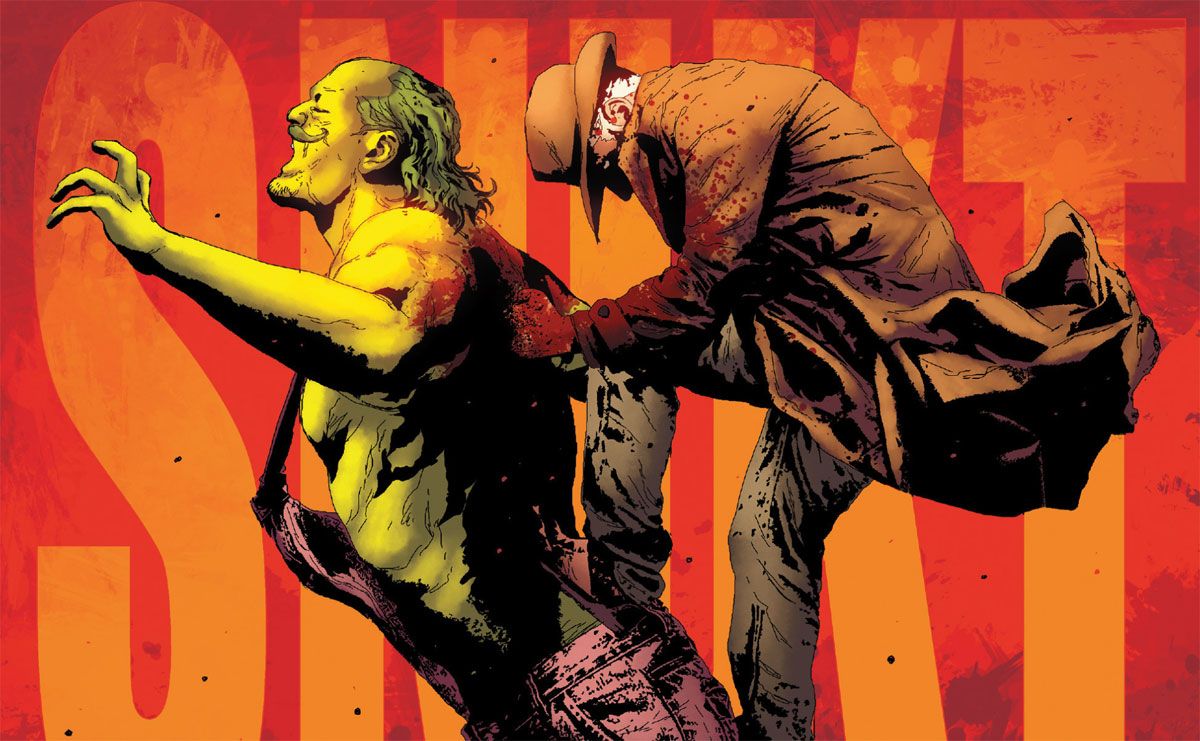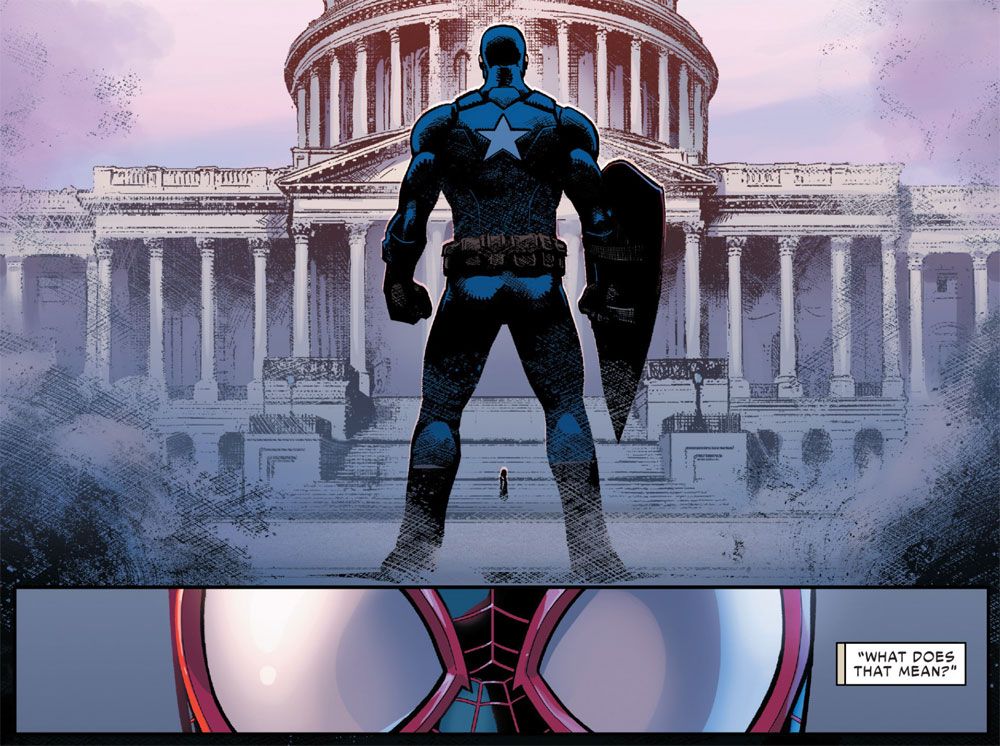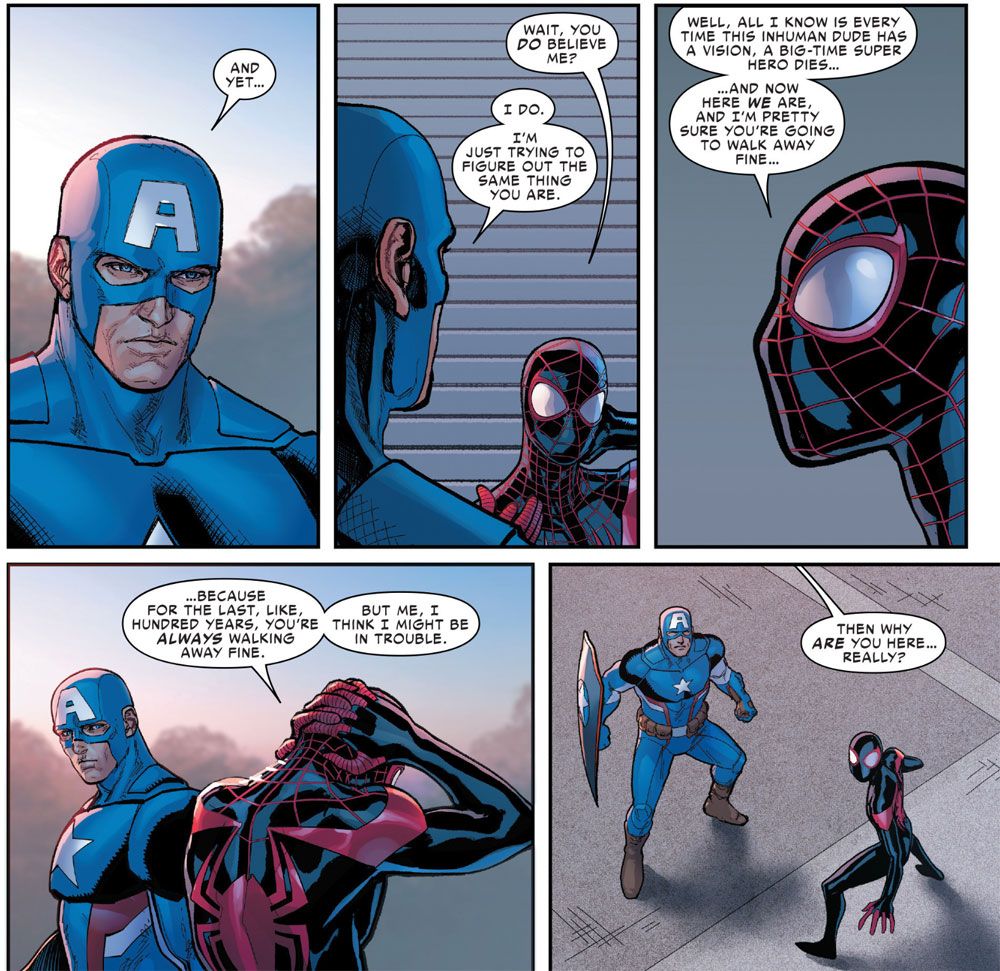WARNING: The following article contains major spoilers for "Civil War II" #7, on sale now.
"Civil War II" #7, by Brian Michael Bendis and David Marquez, largely jettisons the bloated cast and epic fisticuffs in favor of focusing on the series' most relevant characters, and the issue's sole battle seemingly does away with one of them. Before that happens, however, Ulysses' expanding precognitive powers provide a surprising glimpse into a future that just might turn out to be the future of the Marvel Universe.
RELATED: REVIEW: "Civil War II" #7 Slims Down the Cast, Ratchets Up The Tension
In between, the events that may lead up to the previously foreseen deadly showdown between Captain America (Steve Rogers) and Spider-Man (Miles Morales) begin to unfold, but their face-off is interrupted by a possibly fatal encounter as Carol Danvers delivers a blow to a massively armored-up Tony Stark.
A Deadly Path Toward the Next Generation of Marvel Heroes
Tony is the latest of the classic Marvel heroes to be taken off the board; if he's not dead, he's most certainly conspicuous by his absence, as witnessed by not one but two new titles featuring Iron Man, but neither with Tony inside the armor. He was preceded in death by his best friend and armored ally James Rhodes, aka War Machine, as a kickoff to the series resulting from one of Ulysses' visions, and was shortly followed by Bruce Banner, stemming from another prediction by the Inuman. Bruce's demise came at the hand and skillful aim of Clint Barton, aka Hawkeye, who has presumably more or less walked away from his life as a superhero. And of course, the vision of Miles apparently murdering Cap indicates that Steve Rogers may soon be making an exit as well.
The roles of Iron Man, Hulk and Hawkeye have already been assumed by younger characters: Riri Williams is poised to take her role as Ironheart, Amadeus Cho has been a totally awesome Hulk and Kate Bishop has picked up the role of Hawkeye from Hawkguy, who is wandering aimlessly through Middle America. Victor Von Doom stands ready to fill the role of the "other" Iron Man, a la Rhodey, and Sam Wilson has long been acknowledged as the new Captain America. Sam's relative elder status among the younger characters also establishes him as a kind of superhero father figure, not unlike Steve Rogers.
Marvel Comics has proclaimed "Civil War II" as a divisive turning point, but it also seems it may become the mechanism for turning over the Marvel Universe to a new generation. While the faces behind the heroes are different, the essences of these heroes are largely the same: Hawkeye remains the definitive archery champ in the superhero world, The Hulk is still big and green, and Captain America was and still is the American hero and the perfect choice to lead them.
Is "Old Man Logan's" Grim Alternate Future Now Canon?
Tony's apparent death, a full issue ahead of the series finale, isn't the only shocker; Ulysses experiences a new aspect of his evolving powers that results in yet another major surprise. His consciousness is somehow transported to the future, wasted world where Old Man Logan resides, and the one-time Wolverine blames the state of affairs on Tony Stark. That, of course, leads the reader to postulate that the outcome of "Civil War II" might lead to that devastating, post-apocalyptic setting.
Of course, continuity conflicts abound with this potential revelation. The Hulk's hillbilly descendants figured prominently into Mark Millar's original storyline, but The Hulk here is dead and, as far as the world knows, never fathered any little Green Goliaths. Millar's run on "Fantastic Four" alluded to the team's future tying in with that of Logan's, but in the All-New, All-Different post-"Secret Wars" Marvel Universe, the Fantastic Four as a group is nowhere to be found. And if Logan lives long enough to see this future play out (again, for him), then he's going to be Really Old Man Logan.
The theory has merit, however. "Secret Wars" provides a convenient excuse for all sorts of continuity tweaks. A possible case in point: Logan is seen killing one of The Hulk's sons in this issue, and brags of previously taking care of The Hulk himself, but nowhere does he mention that The Hulk was Bruce Banner. The Hulk in this scenario could be another character (Amadeus Cho?), or perhaps a transplanted Bruce from an alternate reality, like Logan himself. A divided set of heroes would be an ideal catalyst for supervillains to band together and rise -- the very shift in power that ushered in Logan's future world in the first place. Also, the absence of both Tony Stark and, presumably, Steve Rogers could likely serve as a killing blow to The Heroic Age, creating a void that the up-and-coming younger heroes just don't have the experience to fill. If this future isn't the future of the mainstream Marvel Universe, spelling out why the dots don't connect might take as much explaining as why they can.
Is This Really The Beginning of the End For Steve Rogers?
Is hasn't been a good year to be Steve Rogers. The shocking revelation that he's covertly operated a Hydra agent for nearly his entire life remains a secret that he's so far kept from his colleagues. However, the startling vision of his grisly death was seen by all. It's easy to connect the two surprises in theor: Cap's cover might eventually get blown, perhaps either by Ulysses or through some other means, and the Sentinel of Liberty suddenly becomes everyone's enemy. The inexperienced Miles might find himself fighting for his life against a battle-hardened hero-turned-foe, and is forced to take Cap's life, possibly as the only means to save his own.
With just one issue remaining in "Civil War II," though, outing Cap doesn't seem to be a likely scenario, especially as this plot thread hasn't been a significant element in Bendis' story – in fact, it hasn't even been mentioned – and the revelation would better serve Nick Spencer's story in the "Captain America" titles. It's never been stated that Ulysses' vision would come to pass within the confines of "Civil War II" anyway, and may perhaps figure later into the conclusion of Spencer's own storyline, when a more-experienced Miles is more likely to have the skillset needed to take down a veteran character. Cap's arrival at the Capitol Building to confront Miles could be rooted in multiple motivations, proving that Ulysses' vision was wrong being the foremost (which would help Cap's case should the Inhuman stumble upon the truth of Steve's Hydra loyalties), but it could also be an attempt to forestall the scenario and take Miles in -- perhaps to Hydra -- in a preventive measure.
But the arrival of Carol, and her apparent murder of Tony in front of both Cap and Miles, is enough to forestall their confrontation and potentially even invalidate Ulysses' prediction. Cap and Miles are unlikely to physically confront Carol without backup, so a probable extrapolation is that other heroes arrive and they do indeed take on Carol, or that she simply leaves. Either way, Miles killing Cap no longer seems a plausible extension of events.
RELATED: Did "Civil War II" Reveal the Next Members of Marvel’s Champions?
While Steve Rogers isn't likely to be the next "hero" to meet his demise in the series, that doesn't mean his eventual death wouldn't have an impact on whatever fallout stems from "Civil War II." If Cap's future death turns out to be a result of the world learning his status as a Hydra agent, then his support of Tony's side in the conflict would be a devastating blow that could potentially undermine that cause, regardless of whether his side had won. This stands to further Carol's goals, and with the slate of young heroes standing ready to oppose her, a world of divided heroes and opportunistic villains paint the picture of a grim future, indeed.

